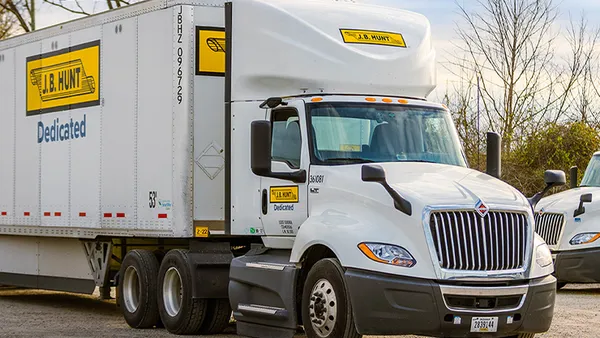Dive Brief:
- Celadon Group and its 25 affiliate companies filed for Chapter 11 bankruptcy Monday morning in the Delaware district of U.S. Bankruptcy Court, according to court documents. The company will cease operations "effective as of today," according to a press release, but is working to get existing loads off the road.
- "Plan is to Liquidate all of Celadon except for Our Taylor Express Subsidiary in Hope Mills, NC," Celadon CEO Paul Svindland wrote to Supply Chain Dive in an email Monday. "Our intent is to ensure drivers deliver their last loads safely and will then be instructed on where to deliver their equipment."
- At the time of shutdown, Celadon had 3,300 tractors, 10,000 trailers and almost 4,000 employees, according to the press release. It is the eleventh largest trucking company by revenue, according to Transport Topics.
Dive Insight:
A message sent to Celadon drivers said the company was working to deliver shipments currently on the road and ensure it didn't leave workers stranded far from home, according to Freightwaves.
"This is noteworthy because of the size of the fleet," Donald Broughton, the principal and managing partner at Broughton Capital, told Supply Chain Dive in an interview. "It’s noteworthy because less than 10 years ago Celadon was known as one of the most active, prolific and successful at salvaging small fleets that were struggling and in trouble."
The failure of Celadon represents the largest trucking failure this year and "certainly one of the largest in history," Broughton said.
The fact the company is initiating Chapter 11 willingly is also extraordinary, Broughton said. This type of action usually comes at the request of bankers who force Chapter 7, he said.
In its court filings, Celadon listed its assets as ranging from between $100 million to $500 million and said its liabilities fell within the same range.
Shippers including Walmart, MillerCoors and Conagra canceled planned loads with the carrier as news of the company's shut down spread across the industry this weekend, Freightwaves reported.
"We’ve been in contact with Celadon and have a transition plan," a Walmart spokesperson told Supply Chain Dive in an email. "Walmart is very fortunate to have a large network of third-party carriers as well as 9,000 private fleet drivers that helps us keep our supply chain moving smoothly without disruption."
The impact on shippers should be fairly minimal, according to Broughton, who said the trucking market currently has more trucks than freight, so it should be easy to find a broker or carrier to carry loads originally scheduled to be hauled by Celadon.
The bankruptcy filing comes less than a week after the U.S. Department of Justice charged the company's former chief operating officer and chief financial officer in a securities and accounting fraud scheme the agency says "resulted in a loss of more than $60 million in shareholder value."
"These senior corporate executives at Celadon allegedly orchestrated a securities and accounting fraud scheme that misled shareholders, banks, accountants, and the investing public," Assistant Attorney General Brian Benczkowski said in a statement.
The charges are the result of the company's trucks losing value, partially as a result of a decline in the trucking market. The executives then misled investors by concealing tens of millions in losses, according to the DOJ.
"Celadon has faced significant costs associated with a multi-year investigation into the actions of former management, including the restatement of financial statements," Svindland said in his statement. "When combined with the enormous challenges in the industry, and our significant debt obligations, Celadon was unable to address our significant liquidity constraints through asset sales or other restructuring strategies."
The failure of a market-leader like Celadon underscores how turbulent 2019 has been for the trucking industry. In 2018, 310 trucking companies went out of business. But by September 2019, that figure reached 640, according to tracking by Broughton. A build-up in truck supply by carriers has not met increased demand in shipments, making it a shipper's market in terms of pricing.
"We have diligently explored all possible options to restructure Celadon and keep business operations ongoing, however, a number of legacy and market headwinds made this impossible to achieve," Svindland said in a press statement.
















